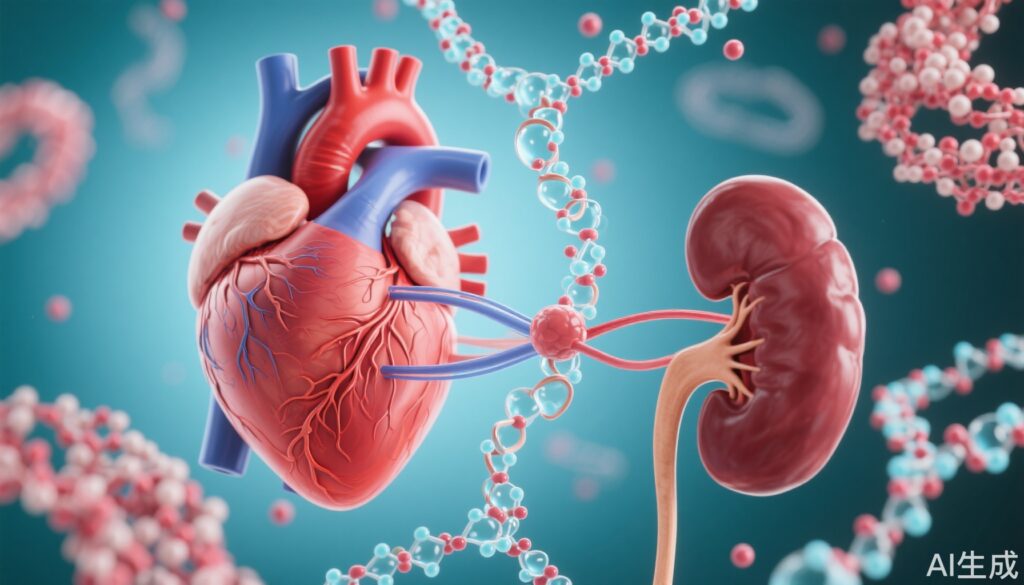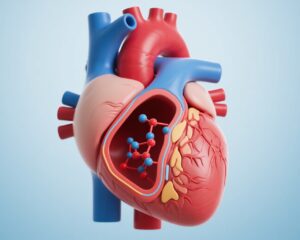Background and Disease Burden
Chronic kidney disease (CKD) is a prevalent condition globally, affecting millions and substantially increasing the risk of cardiovascular complications, notably heart failure (HF). HF presents a major clinical burden with high morbidity and mortality rates. Understanding the pathogenic links between CKD and incident HF remains a critical unmet need. Circulating plasma proteins, as functional effectors and biomarkers, offer a window into molecular pathways that may contribute to HF development in CKD populations. Advanced proteomic technologies now enable comprehensive screening of plasma proteins to uncover novel mechanistic insights and potential clinical targets.
Study Design
This investigation leveraged data from the well-established Atherosclerosis Risk In Communities (ARIC) study, a longitudinal cohort designed to examine cardiovascular risk factors and outcomes. Researchers quantified relative plasma concentrations of 4,697 unique proteins using an aptamer-based assay (Somalogic) in participants at two ARIC visits. Associations between each protein and measures of kidney function—estimated glomerular filtration rate (eGFR) and log-transformed urine albumin-to-creatinine ratio (UACR)—were assessed using multivariable linear regression models. Incident HF events were evaluated through Cox regression models accounting for confounders. Key protein-HF associations were externally validated in the Chronic Renal Insufficiency Cohort (CRIC) study, enhancing robustness. Furthermore, two-sample Mendelian randomization analyses explored potential causal relationships between candidate proteins, kidney function, and HF.
Key Findings
Of the thousands of plasma proteins analyzed, 44 were independently associated with eGFR or UACR and linked to incident HF in fully adjusted models at both ARIC visits. Importantly, 29 of these plasma proteins were validated in the CRIC cohort, underscoring their relevance across diverse CKD populations. Notably, most proteins were associated with HF with preserved ejection fraction (HFpEF), rather than HF with reduced ejection fraction (HFrEF), highlighting distinct pathophysiological mechanisms.
Cluster analysis revealed that a subset of these 44 plasma proteins correlated with adverse cardiac remodeling phenotypes, including increased left ventricular end-diastolic volume index and abnormal diastolic function. This suggests a mechanistic link between kidney-related plasma proteins and cardiac structural and functional deterioration in HF development.
Mendelian randomization analysis notably implicated Golgi membrane protein 1 (GOLM1) as a potentially causal factor influencing both eGFR and HF risk, positioning it as a promising therapeutic target or biomarker candidate.
Expert Commentary
This study robustly demonstrates that specific kidney function-associated plasma proteins are linked to future HF risk independent of traditional demographics and cardiovascular risk factors. The strong validation in the CRIC cohort and sophisticated causal inference methods lend credence to the biological significance of identified proteins, especially GOLM1. However, clinical translation requires further experimental validation of these proteins’ functional roles and therapeutic modulation potential.
The predominance of associations with HFpEF aligns with the recognized overlap between CKD and HFpEF pathophysiology, characterized by systemic inflammation, endothelial dysfunction, and cardiac fibrosis. This proteomic signature provides novel molecular targets for interventions aimed at preventing or delaying HF onset in CKD patients, who often lack effective tailored therapies.
Conclusion
This landmark proteomic analysis from the ARIC study reveals 44 plasma proteins linking CKD to incident HF, largely HFpEF, supported by external validation and Mendelian randomization. These findings advance our understanding of molecular pathways bridging kidney dysfunction and cardiac remodeling and highlight new avenues for biomarker development and therapeutics to mitigate HF risk in CKD. Future research should focus on mechanistic studies and clinical trials targeting these proteins to curtail the substantial HF burden in this vulnerable population.
References
Buckley LF, Dorbala P, Lamberson V, Claggett BL, Ren Y, Grams ME, Coresh J, Matsushita K, Demmer RT, Dubin RF, Deo R, Ganz P, Ballantyne CM, Hoogeveen RC, Yu B, Shah AM. Linking Chronic Kidney Disease to Incident Heart Failure and Adverse Cardiac Remodeling Through the Plasma Proteome: The ARIC Study. JACC Heart Fail. 2025 Aug;13(8):102512. doi: 10.1016/j.jchf.2025.102512. Epub 2025 Jun 26. PMID: 40578264.


